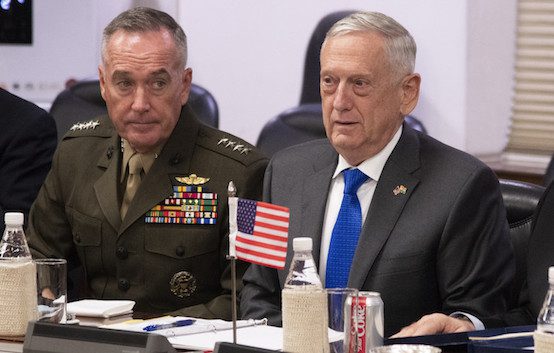The Trump Administration’s Two-Faced Yemen Policy

U.S. officials switch back and forth between insisting that U.S. support for the Saudi coalition is too important to stop to denying that it exists and back again:
Gen Dunford at @postlive event with @IgnatiusPost: US is "not a participant in the civil war in #Yemen nor are we supporting one side or the other."
— Missy Ryan (@missy_ryan) December 6, 2018
The lie that the U.S. isn’t participating in the war on Yemen is an old one, and it spans both the Obama and Trump administrations. The Pentagon has been very careful to stick to this fabrication because once they explicitly admit they are participants in a foreign war without authorization they have to admit that their operations aren’t legal. Pentagon officials have maintained the fiction that U.S. military operations in Syria are covered by the 2001 AUMF (they are not), but since they can’t stretch the AUMF to cover support for the Saudi coalition war they pretend that their role is so limited that it doesn’t count. As far as I can tell, no one actually believes this, and the lie is easily refuted by reading the news, but it remains part of the standard talking points that U.S. officials use to dodge accountability and perpetuate an indefensible policy.
When Congress tries to shut down U.S. support for the war, however, administration officials change their tune. They go from denying participation in the war to vehemently defending their role in backing the Saudis and Emiratis. They issue grave warnings about all of the terrible things that will follow if Congress votes to cut it off. Mattis did this just last week at the farcical “briefing” that he and Pompeo gave to the Senate. The Trump administration unsurprisingly would like to have things both ways: deny that the U.S. is a party to the conflict, but also fight as hard as possible to make sure that the U.S. remains involved in it. That’s the two-faced defense that the administration offers to Congress: we’re not really involved, but don’t you dare withdraw us from the war.
Earlier this week, the administration’s nominee to head Centcom, Lt. Gen. Kenneth McKenzie, came under fire for trying to push these two contradictory claims:
Sen. Tim Kaine (D-Va.) voiced exasperation at what he called a “credibility issue” rooted in the administration’s depiction of its role in the war. “We have had military leaders look at the Senate and say that we are not involved in hostilities to support either side in the Yemeni civil war,” Kaine said.
“One of the reasons that we’re having this debate . . . is we don’t like being told — and we’re proxies for the American public — we don’t like being told we’re not involved in hostilities, when bombs that are falling are made in the United States and when U.S. jets are involved in refueling Saudi bombing runs into Yemen,” he said. “We’re insulted by that. . . . We don’t find that to be believable.”
If U.S. support for the war on Yemen is as limited as administration officials sometimes claim, they should have no problem with stopping it. If that support is important enough that they think it shouldn’t be cut off, it is also important enough that Congress should have had to authorize it. In that case, U.S. involvement for the last forty-four months has been illegal and unauthorized, and so it ought to end anyway. Support for the war on Yemen is indefensible, so it is not a surprise that administration officials have to tell obvious lies to keep it going, but that is one more reason why Congress should put a halt to U.S. involvement at once.
Comments